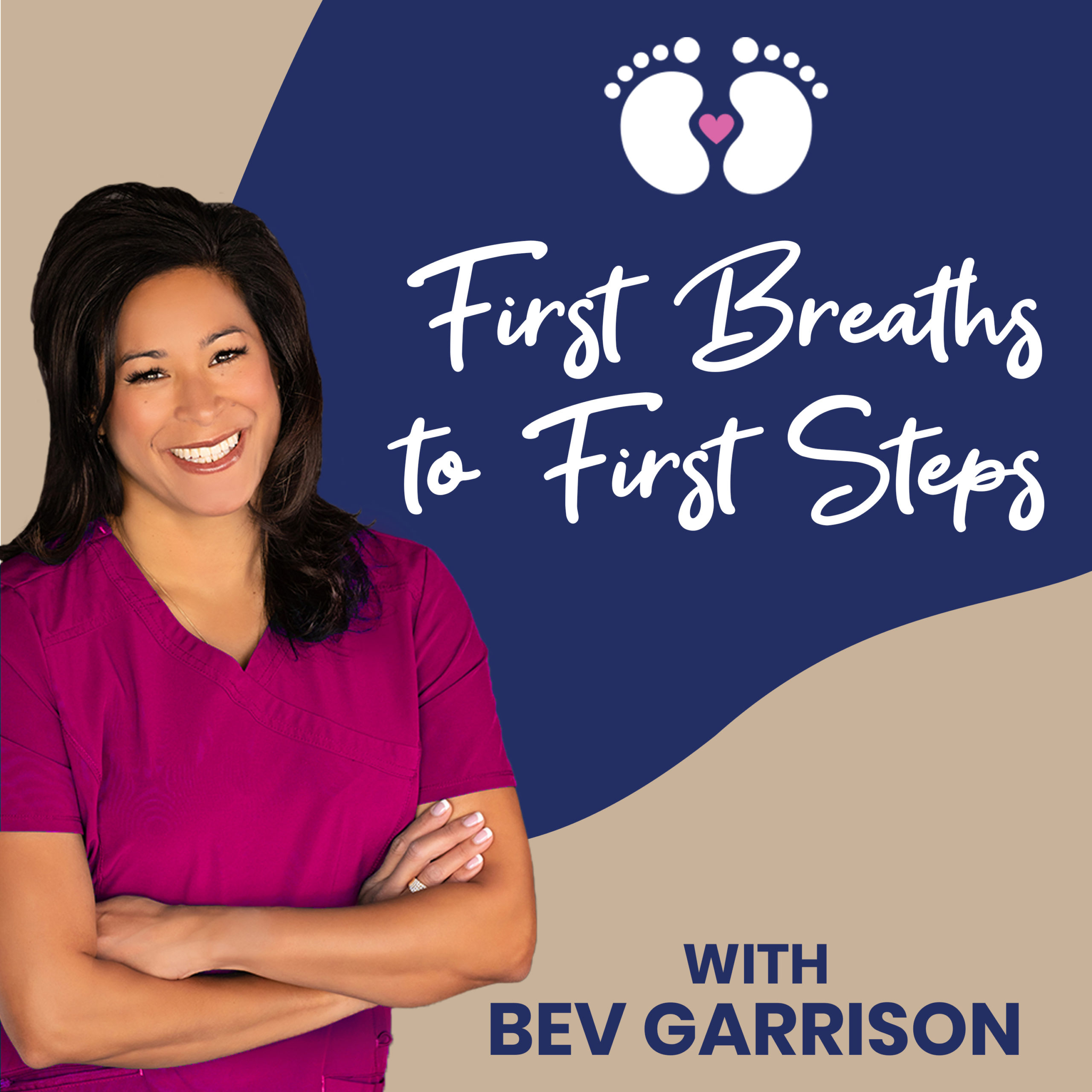Brief chat with Jodi, my “Breastfeeding Guru” to talk about what most new moms wish they knew BEFORE they started breastfeeding their baby!

Episode Transcript
Welcome back to First Breaths to First Steps, this is Bev Garrison. I’m here with Jodi Heiser, breastfeeding guru is what I like to call her. She is a BSN by trait and also a lactation specialist- she is CLC certified and has been a consultant for 12 years now.
Today, we are going to do a podcast on what you wish you knew before you started breastfeeding. Kind of the girlfriends guide to, “Man. I wish someone would have told me that.” We have four concepts that we’re going to go over and Jodi’s going to start us off. Jodi, what do you think is “A”, number one, the first thing that you wish you would’ve known before you started breastfeeding. Well, you know, let’s start with taking a class before, because that’s, before everything starts happening. So really there’s so many things- whether it’s in person or online is going through your hospital or your pediatrician’s office and finding a reputable, breastfeeding class that can, I think we teach you so much about how to give birth, but we don’t give you a lot of information on how to feed that baby once he gets home. So really important to get a class set up before the baby’s born. Yeah and you’ve probably, if you’ve listened to any of my previous pod casts, you can see, I have so many with Jodi. Breastfeeding just takes up a lot of time and it takes a lot of information to get everyone educated and on the right page. So definitely a feeding class or meeting with an expert like Jodi. Having a lactation consultant, maybe someone that you would use even before your baby is born, it’s kind of nice to establish a little bit of a relationship and get that information beforehand.
What else would you say you wish you knew before? I think the hot word right now would be LATCH. Because if it hurts, you’re you’re gonna get yourself damaged. So we really want to make sure that you get help If it hurts is I guess what we’re trying to say. Often you’ll hear people say, “well, it hurts just a little bit in the beginning and there might be that little bit of a twinge” but it should not be painful when you’re breastfeeding over and over again. It’s really important to hook up with a lactation consultant and have them assess and adjust that baby’s latch and teach you how to adjust that baby’s latch when you get home so that you don’t have that damage occur. Right. So I think that the moral of the story there: if it hurts, get help. Right. Get it right away. It’s not a rite of passage. You don’t suffer through it. It’s something you need to address right away. Exactly. I think you bring up another good point just about latch. Everyone talks about the latch, but it’s important to maybe read up on that and just kind of know what, what are people talking about? Why is this such a big deal?
That proper latch really translates to not damaging breast tissue and proper transference of milk to baby. So. It’s so, so important that we really kind of try to. Give you all the tips and tricks beforehand. So that, you know, okay. This latch feels good. Or this latch, does it feel good. I think innately. It’s a little bit interesting that you get pain when it doesn’t feel good, but I think it’s a good thing in the fact that if it doesn’t feel good, you know, something isn’t quite right and it needs to be changed. You gotta make sure that mouth is open wide and a baby gets a big mouthful. Perfect.
What else would you lastly kind of say, man, I wish I would’ve known that before I started breastfeeding. I think that a lot of moms come to us when their supply starts to dwindle. I think knowing that breast milk production is based on a supply and demand situation. So if you decide you’re going to sleep through the night and give your baby a bottle, you’re going to lose that milk production. It’s really important to know that you know, if you want to maintain your milk production means that you have to follow the baby’s feeding schedule, either putting the baby to breast or pumping at that time. That’s hugely important because it’s, it’s a little bit difficult to get the milk production back up. Once we start to see it fall. Right. I see and hear a lot of this from clients in the situation of: I’ve gone back to work and maybe I’m not as diligent at pumping on that schedule that I was when I was home and feeding my baby on a schedule because you didn’t have to do other things that were work oriented. So I think it’s good in thinking about that. When you go back to work, making sure that there’s scheduled time, blocked out time for you to be able to pump and really trying to follow that schedule of what your baby is currently doing when you go back to work. Just knowing that nature does kind of try to modify things. So if you go back to work, you may see that your baby wants to feed more at night, and that’s a natural reaction to you going back to work and the baby trying to maintain that supply for you.
Right. That’s kind of a natural thing baby saying, Hey, I’m going to help you out a little bit because I always tell clients that your baby is the best pump made. It’s better than any pump that you can buy. And so getting that stimulus or getting that suction from your baby and latching from your baby can definitely translate to better supply. I also tell patients to think about, Hey, you know, you’ve been at work all day and you’ve just been using your pump to evacuate that milk. But when you get home, you really do want to latch your baby to help stimulate and encourage that milk production. You might get a little better return. with your baby latching. Yeah. And I think you’ve, you’ve voiced a good point Bev that a baby is always going to be more efficient at removing milk than a pump. It’s just nature. Yeah.
So in summary, the things that we would like to highlight that you should know about before you breastfeed. Is number one, get a class breastfeeding class, read about it, or meet up with the lactation consultant. Number two. Learn and know if your baby is latching and it hurts to get help right away. Don’t wait. Don’t try and muscle through that. Third thing would be read up on a latch and what that looks like. What does that really mean? As far as positioning your baby and how their lips should be and whatnot at the breast. Lastly, the concept of supply and demand, the more demand you put on the system, the more supply we’re going to get back.
If you found the information in our podcast, helpful click on the link in this description, it’ll give you a PDF that you can download our notes. And if you’re also interested in working with me, one-on-one, g uiding your newborn from first breaths to first steps. Click on that link as well. And you can contact me.


